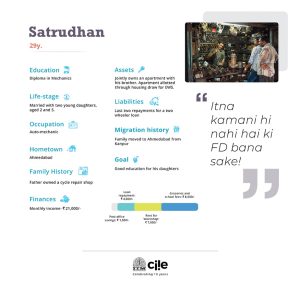People of Bharat: Satrudhan, Ahmedabad
His name is Satrudhan but people call him Satish. So I call him Satish too. As I sit down to ask him questions, a group of two or three men gather around us, curious about what’s happening. I explain to them that it is a confidential interview about one’s incomes and savings. “Is that so?” says one of them, mounting a scooter on a stand close by. “Then we will sit here and make sure he tells you the truth!” quips another, slapping Satish playfully on the back. Satish smiles at me. It’s my cue that he doesn’t mind them there.
I start by asking him where he is from. Satish tells me his father came to Ahmedabad from Kanpur, a small town in Uttar Pradesh and set up a small cycle-repairing store in a posh and busy part of town. Satish was born in Ahmedabad and went to a government school, where he completed his tenth standard. Then he took up a diploma in mechanics from an institute in Pune and returned to Ahmedabad. He started working as an apprentice with a mechanic called Murli who had a small rented shop with all basic machinery and tools. Satish invested his father’s savings into more tools when he started. Murli retired a few years ago and Satish took over the shop and the work.

I ask him about the members in his family. His father has died. He lives with his mother, wife and two young daughters, aged 2 and 5. “Tell him about your other wives!” one of men scolds him. “He has three wives. He has a son too — with another woman in the village!” Satish only smiles. He tells me he lives in a concrete house that belonged to his father. It was bought in 1991.
Satish mainly does servicing work for two wheelers. In addition, sometimes he takes up vehicle repairs. He opens shop at 10 AM and then closes it when he goes home for lunch in the afternoon. He comes back and then works again till 10 PM.
“I am going to ask about your income and savings now” I say, trying to warn him with a look. “Are you going to land an income tax raid on him?” asks one of the men. I shake my head and proceed as one of them lights up a smoke. Satish tells me he earns about Rs. 21,000 a month. He calculates household expenses and groceries, including school fees for his daughter to Rs. 8,000 per month. He has taken a loan from Capital First to buy an Activa and made a down payment of Rs. 20,000. He pays Rs. 4,000 every month towards loan instalments. In a couple of more months, the loan will be repaid. He has a bank account and deposits his extra earnings into his savings account. He does not want a fixed deposit. When I ask him why, he gets irritated. “Itna kamani hi nahi hai ki FD bana sake!” (I don’t earn enough to have an FD). I sense a bruised ego; I assume it must be because of the presence of the other men around. I continue, a bit more cautiously. The only other expense towards the shop is when he needs to buy motor oil from bigger retailers. He invests Rs. 1,000 every month in a post-office scheme. He has an LIC life insurance on his name and makes yearly payments towards that. He pays Rs. 7,000 every month as rent to the shop owner. He indicates towards the man smoking. “He is the shop owner” says Satish. “Is that so?” I ask him. “Yes. The government takes commercial tax from me so I have to charge him (that much)!” he says defensively. “Tell her about your other house” he says to Satish. Satish says it’s not only his house. It is jointly owned by his brother and himself. He had applied for a housing draw conducted by Ahmedabad Urban Development Authority (AUDA) and he got a house in that draw. There was a demolition drive by the government in which their (slum) house was torn down. The government offered affordable housing to people who wanted to apply through the EWS scheme. “If the government gives me another house for pulling down my home, does it count like a new house?! No! It’s just a house in exchange for (another).” says Satish.
One of the men starts bickering. “I have been waiting here since half an hour to get work done from a beggar like you!” Satish retorts, “Who told you to wait? I told you it will take a while? Get it done at the Patel’s shop down the road then! Otherwise leave (the vehicle) here and go. I will see to it!”
I get uneasy now and look to wrap up the interview as soon as I can. He has no aspirations for himself but wants to educate both his daughters. Satish tells me he owns a smartphone. He uses internet to locate dealers of vehicles/spare parts, and sometimes to learn about new model designs when such vehicles come to him for servicing. He finds the torchlight useful while working on repairs. He had started using a digital payment app but discontinued after a while. “Aur koi kar hi nahi raha tha” (Nobody else was using it) says Satish, with a tone of frustration when I push him about the reason for discontinuing. He gets up and starts pottering about the shop. I take it as my cue and leave, thanking him for his time.
This research was developed as part of the Bharat Inclusion Initiative.
